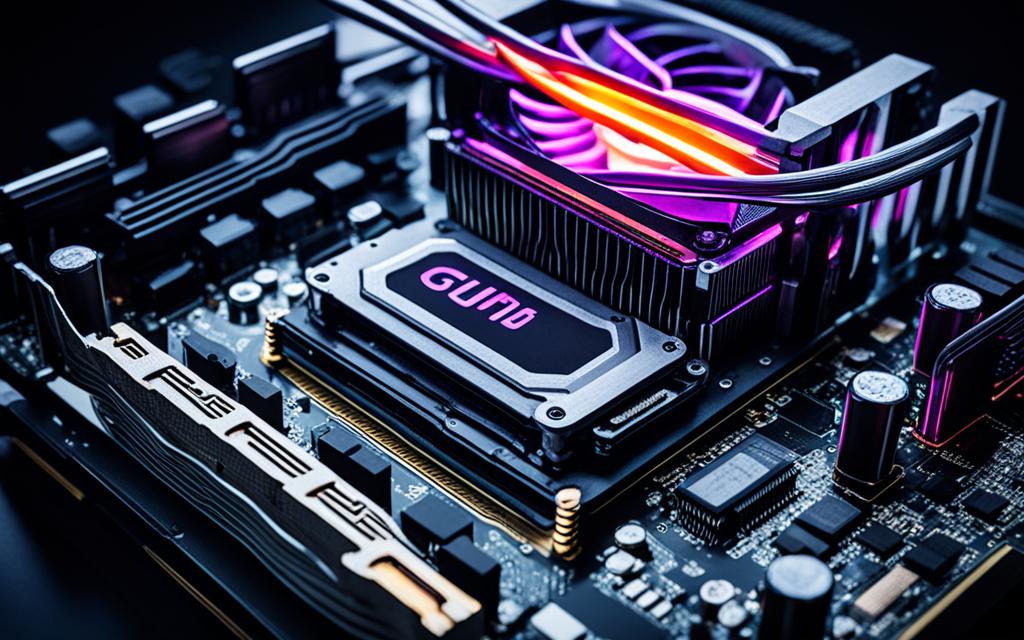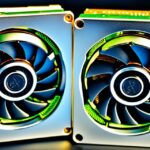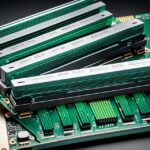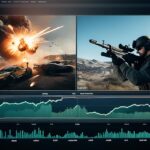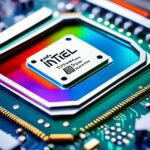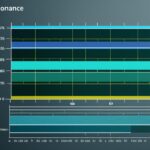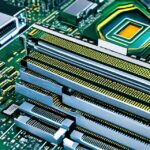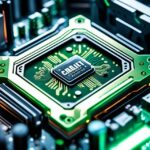Table of Contents
In the gaming world, knowing the difference between a GPU bottleneck and a CPU bottleneck is crucial. This knowledge helps gamers make their systems run better. A GPU bottleneck happens when the graphics card can’t keep up with the processor. Luckily, you can often fix this by simply changing the graphics settings. This change can boost your gaming performance right away1.
On the other hand, a CPU bottleneck occurs when the CPU can’t process data fast enough. This issue can cause annoying frame drops and stuttering2. By understanding these bottlenecks, gamers can figure out how to improve their gaming experience. Let’s dive deeper into the signs, effects, and solutions for GPU and CPU bottlenecks in the next sections.
Key Takeaways
- A GPU bottleneck can often be resolved by lowering graphic settings.
- New graphics cards are typically compatible with existing setups, facilitating easier upgrades.
- CPU bottlenecks tend to result in more noticeable performance issues like stuttering.
- Monitoring CPU and GPU usage aids in identifying the type of bottleneck being faced.
- Investing in the right component based on game type can yield better gaming performance.
Understanding Bottlenecks in Gaming Performance
To really get gaming performance, it’s key to know what a bottleneck is. It’s when a part of your computer limits the whole system’s speed. In gaming, this could be because of your CPU (the brain of your computer) or GPU (the part that handles graphics), leading to bad gameplay and low frame rates.
Studies show even top CPUs can cause bottlenecks3. For example, there’s only a tiny difference in frame rate between two high-end Intel CPUs at 4K. But at 1080p, the difference is huge because of a GPU bottleneck3.
When your CPU is working much harder than your GPU, you’ve got a bottleneck. If your CPU use is over 70% but your GPU isn’t, there’s an issue. This means gamers need to check if their system is well-matched.
Sometimes, having your GPU as the bottleneck isn’t too bad. It means you can still improve your system without buying a whole new computer4. Bottlenecks aren’t just about CPU and GPU. Other parts of your computer can also limit performance. For example, not having enough RAM can stop even the best CPU from performing well during heavy tasks.
| Bottleneck Type | Indicators |
|---|---|
| CPU Bottleneck |
|
| GPU Bottleneck |
|
To get the best gaming experience, keep your system well-balanced and update your software. Understanding these limits helps gamers enjoy smoother gameplay.
To learn more about gaming bottlenecks, check out this helpful guide.
What is a CPU Bottleneck?
A CPU bottleneck happens when the CPU is slower than the GPU. This makes the system unbalanced. The GPU can’t work fully, causing issues like low frame rates and stuttering2. Also, this may lead to input lag and screen tearing when the GPU works faster than the CPU5. This problem can cause overheating and crashes as the CPU tries to keep up5.
Knowing if you have a CPU bottleneck is key for better gaming. Tools like MSI Afterburner can show CPU and GPU usage during games. The ideal scenario is the GPU being nearly 100% used and the CPU not over 80%1. If the CPU falls behind in processing game logic or physics, the game might not perform well, especially in CPU-heavy games.
To fix CPU bottlenecks, make a few adjustments. Increase the game’s resolution to balance the workload. Also, closing apps running in the background can free up CPU resources2. Lowering in-game settings that stress the CPU could make things smoother. Overclocking the CPU and RAM is another way to speed up processing2.
| Issue | Performance Implications |
|---|---|
| Decreased Frame Rates | Impact on smooth gameplay, causing stuttering. |
| Input Lag | Delays between user commands and onscreen actions. |
| Screen Tearing | Visual artifacts from mismatched frame rendering. |
| Overheating | Increased heat output leading to potential hardware damage. |
| System Instability | Crashes or freezes, disrupting the gaming experience. |
Fixing a CPU bottleneck means balancing your system and settings for gaming2.
What is a GPU Bottleneck?
A GPU bottleneck happens when the graphics processing unit can’t keep up with a faster CPU. This creates system limitations that lower graphical performance. In high-demand games, this leads to fewer frames per second (FPS) and possible visual glitches. Especially, achieving smooth gameplay at 60 FPS becomes a struggle, while 30 FPS is the lowest for a decent gaming experience6.
To maintain 30 FPS, the render pipeline in games needs about 33 milliseconds per frame. For 60 FPS, it requires only 16.67 milliseconds. If the GPU can’t render frames this quickly, games won’t play smoothly. This shows why strong GPU and CPU performance are both crucial6.
Identifying a GPU bottleneck involves looking at performance metrics. If the GPU’s working at near 100% but the CPU isn’t, the GPU is the bottleneck5. You can fix this by lowering the resolution and graphics settings. This often makes the GPU and CPU work more harmoniously.
Choosing the right parts for a gaming computer is key to avoiding GPU bottlenecks. A well-matched CPU and GPU ensure smooth and detailed gaming. This balance is critical for an immersive gaming experience without interruptions.
| Performance Indicator | Situation | Recommended Action |
|---|---|---|
| GPU at 99-100% | Possible GPU bottleneck | Lower graphics settings or resolution |
| CPU at 99-100% | Indicates potential CPU bottleneck | Upgrade CPU or optimise settings |
| Lower FPS (30 or below) | Performance issues likelytd> | Assess component compatibility |
Signs of Performance Limitations
Recognising performance limitation signs is key for gamers wanting to improve their experience. Knowing if the CPU or GPU is the problem helps find solutions. Players can then take steps to fix the issues.
Identifying a CPU Bottleneck
When the GPU is ready to render more frames than the CPU can handle, a CPU bottleneck happens. This leads to low GPU utilisation and high CPU usage. Gamers may face annoying FPS drops. Benchmark tests and personal preferences affect how severe this seems. Some games make the CPU work harder than others7. It’s important to use tools to monitor and spot these problems.
Identifying a GPU Bottleneck
In the case of a GPU bottleneck, the GPU is used a lot but performs poorly. This happens when the GPU can’t meet the demands of the game. Players might see issues during competitive games. Applications like machine learning show what a GPU can do. But, they might not work well all the time8. Watching for game lags and checking frame rates can help spot and fix these bottlenecks.
To better their gaming setup, gamers need to know if the CPU or GPU is the hurdle. Solutions might include upgrading or changing settings, especially for GPU issues. Getting advice from online forums offers helpful tips. Players there share how they solved their performance problems1.
Comparing GPU and CPU Bottlenecks
It’s key to know how GPU and CPU bottlenecks differ to boost gaming. Knowing the impact of each bottleneck lets gamers decide on upgrades wisely.
Impact on Gaming Experience
A GPU bottleneck can lead to smoother play, as gamers can tweak settings to get better frame rates. But, a CPU bottleneck can cause game lag and lower frames per second (FPS), which disrupts gameplay. When the CPU is the issue, the GPU is not used as much, which affects how well the game runs9.
This problem can lessen game enjoyment. Big game settings like Building and Terrain Shadows can drop FPS by 3 to 510. If the CPU can’t keep up and settings stay the same, FPS changes little. This shows the need for a balanced system.
Upgrading Solutions for Each Bottleneck
To fix a GPU bottleneck, you could overclock the GPU, get a better one, or lower graphics settings for higher frame rates9. Fixing a CPU bottleneck might need bigger updates, like overclocking the CPU, moving to a better model, or using dual-channel memory. Picking the right CPU is vital for reaching desired frame rates in games9.
Choosing upgrades based on the bottleneck can greatly enhance gaming. It ensures a much better overall gaming experience.
| Bottleneck Type | Common Symptoms | Upgrade Solutions |
|---|---|---|
| GPU Bottleneck | Smooth gameplay with occasional frame drops | Overclock GPU, Upgrade GPU, Lower graphics settings |
| CPU Bottleneck | Stuttering, low FPS, decreased GPU usage | Overclock CPU, Upgrade CPU, Dual-channel cannel memory |
Considering these points when looking at bottlenecks is critical for gamers wanting the best from their systems10.
Is a GPU Bottleneck Better Than a CPU Bottleneck?
When we talk about GPU vs CPU bottleneck, it’s all about their effect on games. A GPU bottleneck is easier to handle because you can just lower the settings. This way, you won’t have to upgrade your system to make games run smoother. On the other hand, a CPU bottleneck is harder to deal with. It happens in games that need more processing power, really affecting how well the game runs.
Research shows that upgrading only the GPU isn’t always wise, as only 2 out of 10 users back this plan11. It’s important to match your CPU and GPU for the best gaming experience. For instance, having an Nvidia 3080 with a weak CPU won’t work well, as reported by 5 out of 10 users11. Also, 4 out of 10 gamers say you need a new CPU and motherboard to get the most from a top-end GPU11.
A CPU bottleneck happens when the CPU can’t keep up with the GPU, making games run poorly. This is especially true for games that rely heavily on the CPU for high frame rates2. In contrast, a GPU bottleneck occurs when the graphics card is the weak link, leading to poor gaming quality12.
To spot bottlenecks, using good monitoring tools is key. Sometimes, all it takes to fix them is turning up your game’s resolution or shutting down extra background apps. When thinking about upgrading, it’s best to consider the whole system to avoid lowering the quality of your gaming experience.
Common Misconceptions About Bottlenecks
Many gamers believe wrong ideas about bottlenecks, which affects their gaming. One myth is that higher frames per second (FPS) always mean better play. But, good gaming needs both the CPU and GPU to work well together. If your CPU can’t keep up with your graphics card, you might face delays in game actions13.
Another mistake people make is thinking one upgrade fixes everything. Games like Minecraft need a strong CPU for the best results. On the other hand, The Witcher 3 requires a powerful graphics card13. It’s important to have a balanced system to avoid these issues.
To improve your gaming, look at both the CPU and GPU. Understanding how components interact can hugely improve your experience. For example, shutting down extra software and adjusting game settings can boost FPS. Also, a budget CPU paired with a top-end GPU might give you more bang for your buck13Understanding the relationship14.
Clearing up myths around CPU and GPU is key to better gaming. It’s not about one being better than the other. By knowing these facts, gamers can choose wisely and improve their gaming fun.
Conclusion
For gamers looking to boost their play, knowing how CPU and GPU bottlenecks differ is key. Recent studies show that, usually, CPUs don’t hold back a GPU’s power in modern setups15. As games get more complex, players should check if their CPU and GPU match well, possibly needing an upgrade16.
Sometimes, games need so much power that the issue isn’t a bottleneck. For example, when playing games in high resolution, the GPU might work harder but the CPU keeps steady. This might mean the game runs well even when it’s pushing the limits17. Knowing this helps players decide on system improvements or game setting tweaks.
To really enhance gaming, it’s all about balance in your computer’s hardware and knowing how to manage what you expect from its performance. With the right knowledge, gamers can face modern gaming challenges better. This makes sure their setups are tuned for the best play experience possible.
FAQ
What is a bottleneck in gaming?
A bottleneck in gaming is a problem where part of your computer slows everything down. It can make games run poorly. This issue can come from either the CPU or the GPU.
How do I identify a CPU bottleneck?
You can spot a CPU bottleneck by watching how the CPU and GPU perform during games. Use tools like MSI Afterburner. If the CPU is working hard but the GPU isn’t, the CPU is the bottleneck.
What are the signs of a GPU bottleneck?
If you have a GPU bottleneck, you’ll see poor frame rates and glitchy images. It happens when the GPU can’t keep up with the CPU’s demands, especially in fancy games.
Is a GPU bottleneck easier to manage than a CPU bottleneck?
Yes, fixing a GPU bottleneck is easier because you can just change game settings. Fixing a CPU bottleneck might mean you need a new processor, which is a bigger task.
How can I improve gaming performance if I have a CPU bottleneck?
To deal with a CPU bottleneck, you might need a better CPU. You can also try fine-tuning your game settings. Make sure your computer is well-cooled and consider faster RAM or a quicker hard drive.
What are common misconceptions about CPU and GPU bottlenecks?
Many think high FPS always means good performance, but bottlenecks matter. Also, upgrading just one part often isn’t enough. You need a well-balanced system for the best gaming.
How can I effectively allocate my upgrade budget?
First, figure out what’s slowing down your games. Upgrading your GPU is usually simpler. But enhancing your CPU might mean you also need a new motherboard and RAM for compatibility.
Are there any graphical settings that can alleviate a GPU bottleneck?
Yes, reducing settings like shadow quality, texture detail, and anti-aliasing can ease a GPU bottleneck. This makes games run smoother and look better.
Source Links
- https://www.howtogeek.com/cpu-or-gpu-bottleneck-how-to-tell-and-which-is-worse/ – CPU or GPU Bottleneck? How to Tell (and Which Is Worse)
- https://www.partitionwizard.com/partitionmagic/cpu-gpu-bottleneck.html – CPU & GPU Bottleneck: What Are They and How to Fix Them? – MiniTool Partition Wizard
- https://www.digitaltrends.com/computing/what-is-a-pc-bottleneck/ – What is a PC bottleneck, and how do I avoid one? | Digital Trends
- https://softwareg.com.au/blogs/computer-hardware/cpu-bottleneck-vs-gpu-bottleneck – CPU Bottleneck Vs Gpu Bottleneck
- https://www.lenovo.com/us/en/glossary/cpu-bottlenecking/ – What Is a CPU Bottlenecking & How to Fix It
- https://www.howtogeek.com/757556/what-is-a-cpu-or-gpu-bottleneck-in-pc-gaming-and-how-to-fix-it/ – What Is a CPU or GPU Bottleneck in PC Gaming? (and How to Fix It)
- https://www.xda-developers.com/cpus-bottlenecks-games-problem-cpu-benchmarking/ – CPUs, bottlenecks, and games: the problem with CPU benchmarking
- https://www.weka.io/learn/gpu/what-is-a-gpu/ – Graphics Processing Unit (GPU): Everything You Need to Know
- https://pcpartpicker.com/forums/topic/214851-on-cpugpu-bottlenecking-in-games – On CPU/GPU bottlenecking in games – PCPartPicker
- https://forums.flightsimulator.com/t/cpu-bottlenecked-or-main-thread-limited-try-this/548617 – CPU Bottlenecked or Main thread limited? Try this
- https://community.spiceworks.com/t/is-this-gpu-a-bottleneck-for-my-old-cpu/957042 – is this GPU a bottleneck for my old CPU
- https://www.pcworld.com/article/1955495/pc-bottlenecks-cpu-or-cpu-limiting-gaming-performance.html – PC bottlenecks explained: How to know if your CPU or GPU is limiting games
- https://blog.xidax.com/cpu-and-gpu-bottleneck-identification-and-solutions/ – CPU and GPU Bottleneck Identification and Solutions | Xidax
- https://www.reddit.com/r/Amd/comments/cdnaqo/misconceptions_of_cpu_bottleneck/ – Reddit – Dive into anything
- https://forums.tomshardware.com/threads/cpus-bottleneck-game-performace-but-not-the-gpu.732071/ – CPU’s bottleneck Game performace, but NOT the GPU.
- https://forums.anandtech.com/threads/someone-explain-modern-cpu-and-gpu-bottlenecks.2197372/ – Someone explain Modern CPU and GPU Bottlenecks?
- https://forums.evga.com/GPU-or-CPU-bottleneck-m2814658.aspx – GPU or CPU bottleneck? – EVGA Forums

